|
|
|
Sort Order |
|
|
|
Items / Page
|
|
|
|
|
|
|
| Srl | Item |
| 1 |
ID:
161493
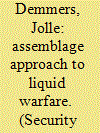

|
|
|
|
|
| Summary/Abstract |
The Western state-led turn to remote forms of military intervention as recently deployed in the Middle East and across Africa is often explained as resulting from risk aversion (avoidance of ground combat), materiality (‘the force of matter’) or the adoption of a networked operational logic by major military powers, mimicking the ‘hit-and-run’ tactics of their enemies. Although recognizing the mobilizing capacities of these phenomena, we argue that the new military interventionism is prompted by a more fundamental transformation, grounded in the spatial and temporal reconfiguration of war. We see a resort to ‘liquid warfare’ as a form of military interventionism that shuns direct control of territory and populations and its cumbersome order-building and order-maintaining responsibilities, focusing instead on ‘shaping’ the international security environment through remote technology, flexible operations and military-to-military partnerships. We draw upon assemblage as a heuristic device and the case of the US Africa Command (AFRICOM) to flesh out the complex and fluid nature of liquid warfare and the ways by which power operates across space. We outline how the forging of a transnational military assemblage in the name of ‘hunting Kony’ allowed for the buildup of an archipelago of military bases and operational capabilities across Africa, which serve as hubs for the monitoring, disrupting and containment of potential risks and dangers.
|
|
|
|
|
|
|
|
|
|
|
|
|
|
|
|
| 2 |
ID:
183466
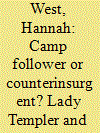

|
|
|
|
|
| Summary/Abstract |
British counterinsurgency thinking today remains strongly influenced by the Malaya Emergency (1948–1960) but little-known is the extensive women’s outreach program, pioneered by Lady Templer, involving the Women’s Institute and British Red Cross. Through discourse analysis of archival records, this article identifies four discourses characterizing British women’s participation, used, at the time, to make acceptable their presence whilst distancing them from the counterinsurgency campaign. By exploring how women’s presence has been negotiated and marginalized, I will reveal the blurred boundaries of counterinsurgency, questioning how the role of the counterinsurgent is constructed and sustained over time and for what purpose.
|
|
|
|
|
|
|
|
|
|
|
|
|
|
|
|
| 3 |
ID:
157919
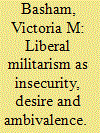

|
|
|
|
|
| Summary/Abstract |
The use and maintenance of military force as a means of achieving security makes the identity and continued existence of states as legitimate protectors of populations intelligible. In liberal democracies, however, where individual freedom is the condition of existence, citizens have to be motivated to cede some of that freedom in exchange for security. Accordingly, liberal militarism becomes possible only when military action and preparedness become meaningful responses to threats posed to the social body, not just the state, meaning that it relies on co-constitutive practices of the geopolitical and the everyday. Through a feminist discursive analysis of British airstrikes in Syria and attendant debates on Syrian refugees, I examine how liberal militarism is animated through these co-constitutive sites, with differential effects. Paying particular attention to gender and race, I argue that militarism is an outcome of social practices characterized as much by everyday desires and ambivalence as by fear and bellicosity. Moreover, I aim to show how the diffuse and often uneven effects produced by liberal militarism actually make many liberal subjects less secure. I suggest therefore that despite the claims of liberal states that military power provides security, for many militarism is insecurity.
|
|
|
|
|
|
|
|
|
|
|
|
|
|
|
|
| 4 |
ID:
157917
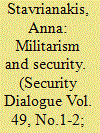

|
|
|
|
|
| Summary/Abstract |
While attention to security has grown exponentially over the last few decades, militarism – the preparation for and normalization and legitimation of war – has not received the widespread and sustained focus it warrants in mainstream or critical circles. Rather than stake a claim for one concept over the other, however, this article – and the special issue to which it serves as an introduction – asks how we are to understand the relationship between security and militarism, both as analytical tools and as objects of analysis. We examine, first, what analytical and political work militarism and security do as concepts, and how they can be mobilized methodologically; second, what the possibilities are of fruitful exchange between knowledges produced about these concepts or practices; and, third, what the limits are of militarism and security. In the process, we address the shifts in the world that international relations and its related subfields study; shifts in the institutional framing and materiality of fields and subfields of research; and shifts in how international relations studies the world. Read together, the contributions to the special issue make the case for a reinvigorated focus on the mutual co-constitution of militarism and security.
|
|
|
|
|
|
|
|
|
|
|
|
|
|
|
|
| 5 |
ID:
157927
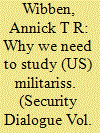

|
|
|
|
|
| Summary/Abstract |
Responding to the special issue call to examine security and militarism alongside one another, this article adopts a critical feminist lens to explore what is at stake when critical scholars study security rather than militarism – and why, for critical feminists in particular, studying one without attention to the other is not helpful. Anchoring the discussion of (US) militarism in ongoing debates about women in combat, the article proposes that studying security without attention to militarism leads scholars to miss the deeply militarist orientation of security studies. It further suggests that feminist scholarship, because it treats militarism and militarization as an integral part of feminist security studies and considers the everyday a crucial site for inquiry, is well suited to studying militarism and security alongside one another. The article then lays out what a critical feminist approach to studying militarism entails and presents some feminist insights on militarization, focusing in particular on what attention to gender can reveal about shared norms of manliness and war. Overall, the article shows why feminist perspectives offer such strikingly different insights into the relationship between militarism and security and what we miss when feminist scholarship is ignored or marginalized in scholarship on these issues.
|
|
|
|
|
|
|
|
|
|
|
|
|
|
|
|
|
|
|
|
|